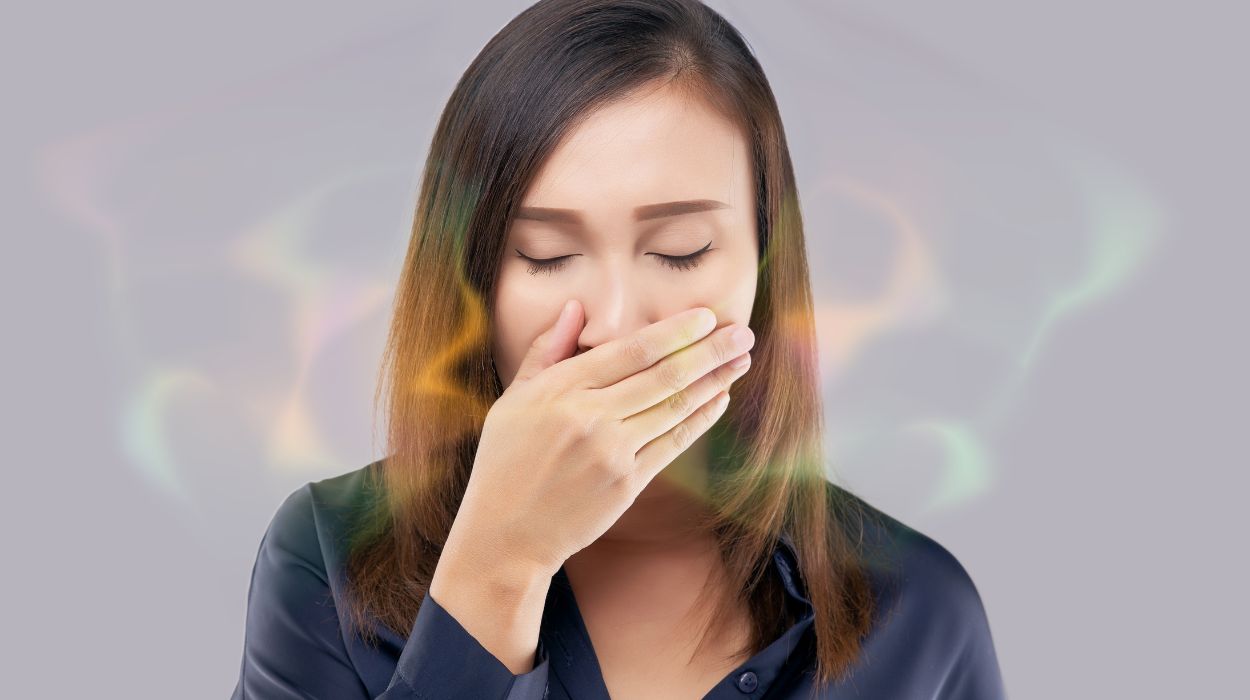 Expert's opinion
Expert's opinion
Expert's opinion
The article is a subjective view on this topic written by writers specializing in medical writing.
It may reflect on a personal journey surrounding struggles with an illness or medical condition, involve product comparisons, diet considerations, or other health-related opinions.
Although the view is entirely that of the writer, it is based on academic experiences and scientific research they have conducted; it is fact-checked by a team of degreed medical experts, and validated by sources attached to the article.
The numbers in parenthesis (1,2,3) will take you to clickable links to related scientific papers.
What Causes Bad Breath From The Stomach? How To Treat It 2024?

Most people think their bad breath is due to mouth bacteria encouraging them to brush or gargle more often. Or that their sore throat may be the problem. But to connect it to your gut? How is this possible?
Although the majority of bad breath, medically called halitosis, can result from poor dental health habits, it may be a sign of other health problems. An imbalance in the digestive system could be the underlying cause. Since your digestive system consists of not only the mouth but also the esophagus, stomach, and small and large intestines, a problem in any of these areas could cause bad breath.
Causes Of Bad Breath
- The breakdown of food particles around teeth
- Tobacco products
- Poor oral hygiene
- Dry mouth
- Dehydration
- Medications
- Infections in the mouth or gums
- Other mouth, nose, and throat conditions
What Causes Bad Breath From The Stomach
Your mouth has its oral microbiome. If toxins and bad bacteria are left untreated, they can be the source of cavities, gum disease, tonsil stones, and other oral health issues. Dental or gum problems, in addition to decayed teeth, are the causes of a majority of people with bad breath. Common causes of bad breath include:
- Food: The breakdown of food particles in and around your teeth can increase bacteria and cause a foul odor. Another reason to brush after you eat.
- Tobacco products. Smoking causes an unpleasant mouth odor.
- Poor oral hygiene: Good hygiene includes daily brushing, flossing, and possibly tongue scraping.
- Dry mouth: This can be due to not drinking enough water or to a malfunction in the salivary glands.
- Dehydration: Not drinking enough water can cause bacteria to build up in your mouth.
- Medications: Some have an unpleasant taste.
- Infections in your mouth or gums: Including gingivitis, periodontal disease, and decaying teeth.
- Other mouth, nose, and throat conditions: Such as tonsillitis, seasonal allergies, and respiratory infections like chronic sinusitis, pneumonia, and bronchitis.
Featured Partner

Low-Calorie
Non-GMO
Vegan-friendly
Get Blown Away By Expert-Crafted Formula
Learn More About Colon Broom – one of the quality supplements promoting regular bowel movements, alleviates bloating, and supports healthy cholesterol levels.
Other Causes For Bad Breath
Problems in your mouth that may give you bad breath could be linked to hidden causes indicating a more serious ailment or disease. Examples include:
Diabetes may raise glucose levels in your mouth, promoting bacterial growth, infection, and gum disease which includes gingivitis and periodontitis. All these often produce halitosis.[1] Fruity-smelling breath is a sign of high levels of ketones in someone who already has diabetes.
Chronic acid reflux known more commonly as Gastroesophageal Reflux Disease (GERD) allows intestinal gas and stomach acid to reflux into the esophagus which might produce bad breath. If you tend to have heartburn or reflux, your bad breath could be related to the excess acid produced by your digestive tract.
Gastrointestinal issues such as gastritis, stomach ulcers, intestinal obstruction, and inflammatory bowel disease are conditions that studies show are related to imbalances in the gut microbiome. For example, certain types of H. pylori[2] bacteria are known to cause stomach ulcers. Halitosis is a symptom often seen in H. pylori infections.
Chronic lung infections such as lung cancer will usually cause a distinct breath odor. Cystic fibrosis and asthma are two other lung disorders that have a distinct acidic odor that is associated with them.
Advanced liver or kidney disease can lead to bad breath because of the smell of toxic substances that would be filtered out of your body by properly functioning kidneys or liver. Chronic kidney disease is a serious cause of breath that smells like urine. Dysfunctional kidneys can cause waste to build up in the bloodstream, leading to a metallic taste in the mouth and breath that smells strongly of ammonia. Serious liver disease can make your breath smell musty or like garlic and rotten eggs.
Heart disease. According to the Cleveland Clinic, some studies have shown that bacteria in the mouth that often cause periodontal disease can move into the bloodstream causing inflammation in the blood vessels. These changes can, in turn, increase the risk of heart disease and stroke. Bleeding gums and bad breath could be early indicators of heart or circulatory disease.
How To Eliminate Bad Breath From Stomach?

Bad breath treatments are numerous judging by the plethora of over-the-counter products available. Assuming you already have good oral hygiene, you might want something you can make at home. Try one of these natural bad breath remedies.
- Make a mouthwash using a small amount of salt or apple cider vinegar in a glass warm of water.
- Brush your teeth with a drop or two of tea tree oil.
- Suck on a clove known to have antibacterial properties as well as a fresh smell.
If your bad breath continues, however, have your doctor check for more serious underlying causes.
About Our Gut Health
The intestinal flora known as your microbiome must stay in balance to function properly in absorbing and digesting nutrients from the food you eat. You may need to boost your gut health to accomplish this. The billions of good bacteria in the gut can be thrown out of balance by bad organisms, causing unhealthy symptoms. This disruption of the composition and diversity of the gut microbiome is called dysbiosis.
The role of a healthy microbiome is to serve as a strong barrier between the digestive tract and the rest of the body. When this barrier is weakened, it becomes damaged, develops holes, and cannot optimally function as a barrier any longer. It then allows harmful substances like gluten, bad bacteria, and undigested food particles, compounds, and toxins to “leak” through. When this happens, these substances enter your system causing irritation and inflammation throughout the body and considerable damage to your health.
Dysbiosis[3] has been associated with a range of different gastrointestinal and non-gastrointestinal diseases including neurologic, metabolic, liver, inflammatory, and infectious diseases. These may affect the health of your mouth through the toxins and other unpleasant compounds they produce thus causing bad breath.
The Importance Of Diet To Reduce Bad Breath From Gut

Eating a diversity of plant-based foods such as those on the food list that support different types of microbial organisms can help to maintain the health of not only the microbiome but also the entire body. It may help to treat and prevent halitosis by keeping the gut microbiota in balance. Although some healthy foods like garlic can give you temporary bad breath, long-term bad breath is more likely an indication of an imbalance in your diet which can lead to an imbalance in your gut microbiome with possibly more serious conditions.
Research has shown that consuming probiotics[4] along with a healthy diet can help maintain a healthy gut. Probiotics are living microorganisms found naturally in fermented foods such as yogurt, kimchi, kombucha, sauerkraut, miso, and kefir. These friendly bacteria compete for space and food against harmful bacteria thus preventing them from settling in the gut. Many of the microorganisms in probiotic products are the same as or similar to microorganisms that naturally live in our bodies. The bacteria most frequently utilized as probiotics are in the Lactobacillus and Bifidobacterium families.
A recent study released by the International Health Journal of Science and Medical Research cited the oral health benefits of the probiotic[5] K12 ingredient in preventing recurrent infections in the mouth and throat by boosting good bacteria and strengthening the immune system. You simply put one pill in your mouth and let it dissolve after you brush your teeth in the morning. Conversely, you can take it at night after brushing your teeth to combat morning breath.
Conclusion
If you have stomach-related bad breath, review your oral hygiene habits. Try making lifestyle changes, such as brushing your teeth and tongue after eating, using dental floss, and drinking plenty of water. If your bad breath persists after making oral hygiene changes, see your dentist. If your dentist suspects a more serious condition is causing your bad breath, he or she may refer you to a physician to help find the cause of the odor.
Bad breath can also be a sign of a more serious condition. The food you eat impacts the bacterial balance in your gut. When this balance suffers, toxins can leak into the rest of your body reaching other organs where disease may begin. This disease can then put further toxins into your system. Some of these reach your mouth where bad breath can develop. It is a fascinating cycle.
Soon, analyzing your breath[6] may become common. Researchers have come up with a powerful new way to detect the signatures of various diseases by using what is known as your “breath print” which is a unique tool similar to your fingerprint to help diagnose a variety of diseases. The researchers hope that using artificial intelligence to match up the varying levels and ratios of 13 key chemical compounds found in human breath to different diseases, will pave the way for a versatile medical diagnostic tool. After sampling the breath of more than 1,400 people, they found that their technique was able to discriminate among diseases with 86 percent accuracy.
+ 6 sources
Health Canal avoids using tertiary references. We have strict sourcing guidelines and rely on peer-reviewed studies, academic researches from medical associations and institutions. To ensure the accuracy of articles in Health Canal, you can read more about the editorial process here
- GW;Manz, T. (2023). Diabetes, periodontal diseases, dental caries, and tooth loss: a review of the literature. Compendium of continuing education in dentistry (Jamesburg, N.J. : 1995), [online] 25(3). Available at: https://pubmed.ncbi.nlm.nih.gov/15641324/.
- Adler, I., Denninghoff, V., Albers, I., Avagnina, A., Ricardo and Elsner, B. (2005). Helicobacter pylori Associated with Glossitis and Halitosis. Helicobacter, [online] 10(4), pp.312–317. doi:https://doi.org/10.1111/j.1523-5378.2005.00322.x.
- Gisela Adrienne Weiss and Thierry Hennet (2017). Mechanisms and consequences of intestinal dysbiosis. Cellular and Molecular Life Sciences, [online] 74(16), pp.2959–2977. doi:https://doi.org/10.1007/s00018-017-2509-x.
- Femke Lutgendorff, L.M.A. Akkermans and Söderholm, J.D. (2008). The Role of Microbiota and Probiotics in Stress-Induced Gastrointestinal Damage. Current Molecular Medicine, [online] 8(4), pp.282–298. doi:https://doi.org/10.2174/156652408784533779.
- Egija Zaura and Svante Twetman (2019). Critical Appraisal of Oral Pre- and Probiotics for Caries Prevention and Care. Caries Research, [online] 53(5), pp.514–526. doi:https://doi.org/10.1159/000499037.
- Nakhleh, M.K., Haitham Amal, Raneen Jeries, Broza, Y.Y., Aboud, M., Alaa Gharra, Hodaya Ivgi, Khatib, S., Shifaa’ Badarneh, Lior Har‐Shai, Glass-Marmor, L., Izabella Lejbkowicz, Miller, D.H., Samih Badarny, Winer, R., Finberg, M., Cohen‐Kaminsky, S., Perros, F., Montani, D. and Girerd, B. (2016). Diagnosis and Classification of 17 Diseases from 1404 Subjects via Pattern Analysis of Exhaled Molecules. ACS Nano, [online] 11(1), pp.112–125. doi:https://doi.org/10.1021/acsnano.6b04930.



